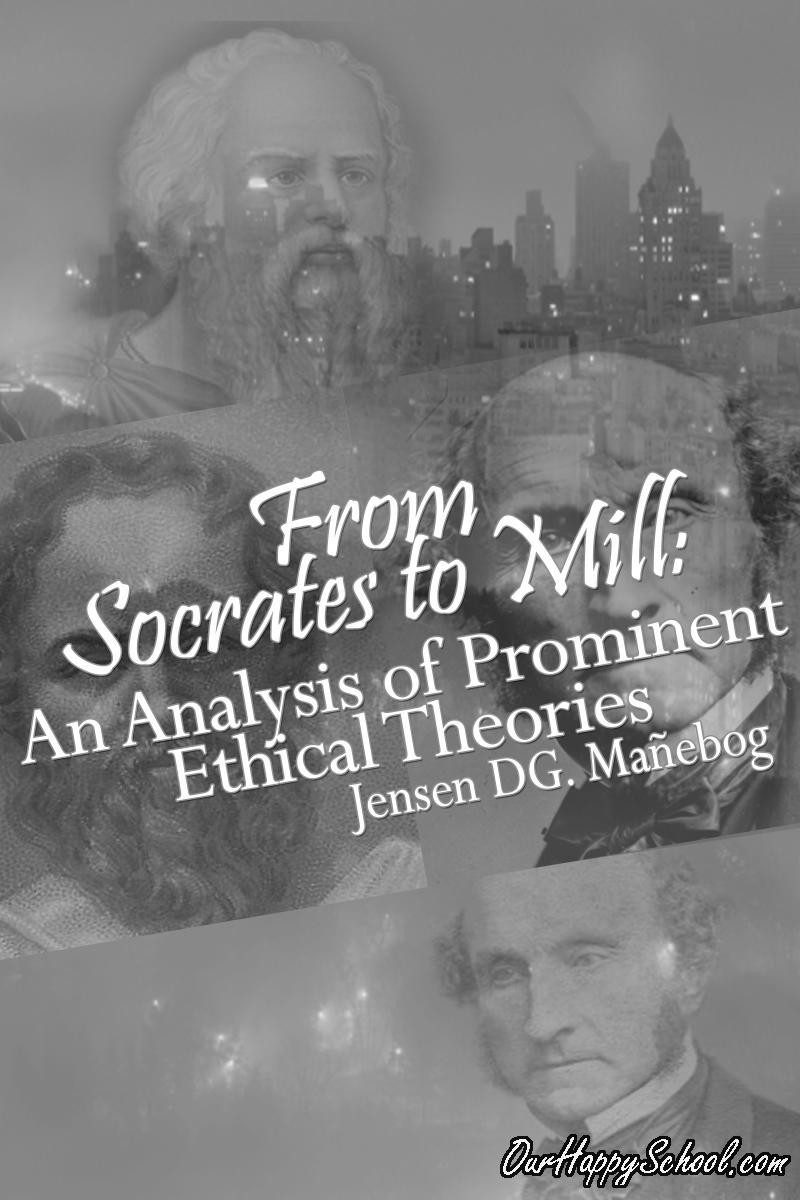Sponsored Links
What moral theory are you following?
Editor’s note: As it gives guidelines in choosing a sound moral theory to follow in one’s life, this article is helpful not only to Ethics students.
© 2010 by Jensen dG. Mañebog
‘MORALITY’ GENERALLY REFERS to the rightness or wrongness of something, as of human actions, as judged by certain standard/s. To define it further, there is a need to discuss some of its features as a subject matter …
1. Humans experience a sense of moral obligation and accountability
It had long been proven that though one can doubt almost everything in a Cartesian fashion, one nevertheless could not doubt successfully his own existence. And we may add, one cannot doubt successfully a phenomenon of his own existence—namely, his moral experience.
 Regarding man’s experience of moral obligation, we could see that even non-theists give evidence that men do experience moral obligation. Contemporary secularist Kai Nielsen, for instance, recommends that one “ought” to act or follow the rule, policy, practice, or principle that maximizes happiness and minimizes pain. Concerning his principle of justice, he states in his book Ethics Without God that, “… it is not enough just to seek maximization of human happiness… and minimization of suffering, but that we must maximize and minimize it fairly.”[1] Obviously, Nielsen’s “must” should be taken as a term of moral obligation such as “ought” or “should.” From this, it is clear that he recognizes that we people do experience moral obligation. Even the outspoken atheist Richard Dawkins… explicitly declares that there are “moral instruction[s] on how we ought to behave”…[2]
Regarding man’s experience of moral obligation, we could see that even non-theists give evidence that men do experience moral obligation. Contemporary secularist Kai Nielsen, for instance, recommends that one “ought” to act or follow the rule, policy, practice, or principle that maximizes happiness and minimizes pain. Concerning his principle of justice, he states in his book Ethics Without God that, “… it is not enough just to seek maximization of human happiness… and minimization of suffering, but that we must maximize and minimize it fairly.”[1] Obviously, Nielsen’s “must” should be taken as a term of moral obligation such as “ought” or “should.” From this, it is clear that he recognizes that we people do experience moral obligation. Even the outspoken atheist Richard Dawkins… explicitly declares that there are “moral instruction[s] on how we ought to behave”…[2]
These prove very well that even secularists do recognize that humans are moral agents and that they can possess knowledge that some things oughtto be done while other things ought notto be done. Such fundamental moral concepts (i.e., terms of moral obligation), as clearly suggested even by non-theists, has “binding force” and “overriding character” features that explain that which we call moral accountability.
2. Moral values and moral absolutes exist
 Doctor of Philosophy William Lane Craig claims that there is no more reason to deny the objective reality of moral values than the objective reality of physical objects. He claims that actions like rape, torture, and child abuse are not just socially unacceptable behavior but are moral abominations.[3] Even Michael Ruse himself, a secularist and a known Darwinist, admits, “The man who says it is morally acceptable to rape little children is just as mistaken as the man who says 2+2=5.”[4]
Doctor of Philosophy William Lane Craig claims that there is no more reason to deny the objective reality of moral values than the objective reality of physical objects. He claims that actions like rape, torture, and child abuse are not just socially unacceptable behavior but are moral abominations.[3] Even Michael Ruse himself, a secularist and a known Darwinist, admits, “The man who says it is morally acceptable to rape little children is just as mistaken as the man who says 2+2=5.”[4]
Some actions are therefore really wrong. In the same way, some things like love and respect are truly good. We can also identify some discernible moral absolutes—truths that exist and apply to everyone. Some authors give as an example the absolute that “you ought not to torture babies for fun on feast days.” It seems to be a self-evident moral rule that it does not matter who you are or where you are or what time or culture you are in, that it is hard to imagine that such a thing could ever be morally justified, or how something like that could ever be considered anything less than evil.
3. ‘Moral law’ therefore exists
When we accept the existence of goodness, we must affirm a moral law on the basis of which to differentiate between good and evil. Thus, if it is true that some actions are good and some are actually bad, then it is also true that moral law exists.
 The classic writer and philosopher C.S. Lewis in his book The Case for Christianity demonstrates the existence of a moral law or standard by pointing to men who quarrel. He explains that whenever we witness two persons quarreling, we often hear them making remarks against each other. Lewis contends that the man who makes the remarks is not just saying that the other man's behavior does not happen to please him. He is rather appealing to some kind of standard of behavior that he expects the other man to know about. It looks, in fact, very much as though both parties had in mind some kind of Law or Rule of fair play or decent behavior or moral rule about which they really agreed upon. Quarrelling, according to Lewis, means trying to show that the other man is in the wrong. And there would be no sense in trying to do that unless they had in a way some sort of “agreement” as to what right and wrong are; just as there would be no sense in saying that a basketball player committed a violation unless there was some agreement about the rules of the game. In morality, according to Lewis, moral law exists and it is the “rule of the game.” [5]
The classic writer and philosopher C.S. Lewis in his book The Case for Christianity demonstrates the existence of a moral law or standard by pointing to men who quarrel. He explains that whenever we witness two persons quarreling, we often hear them making remarks against each other. Lewis contends that the man who makes the remarks is not just saying that the other man's behavior does not happen to please him. He is rather appealing to some kind of standard of behavior that he expects the other man to know about. It looks, in fact, very much as though both parties had in mind some kind of Law or Rule of fair play or decent behavior or moral rule about which they really agreed upon. Quarrelling, according to Lewis, means trying to show that the other man is in the wrong. And there would be no sense in trying to do that unless they had in a way some sort of “agreement” as to what right and wrong are; just as there would be no sense in saying that a basketball player committed a violation unless there was some agreement about the rules of the game. In morality, according to Lewis, moral law exists and it is the “rule of the game.” [5]
4. ‘Moral law’ is known to humans
Moral law is also called Law of Nature because early philosophers, according to Lewis, thought that everybody knows it by nature and does not need to be taught it. They did not mean, of course, that we would not find an odd individual here and there who does not know it, just as we find some who are colorblind or dyslexic or tone-deaf. Generally speaking, nevertheless, the human idea of moral law is obvious to everyone, early thinkers contended so.
Lewis believes that they were right, for if they were not, then all the things we say about war, for instance, would be nonsense. He stresses that there would be no sense in saying that the enemy is in the wrong unless “right” is a real thing which the opponent country knows as well as the other does, and ought to practice. If one, says Lewis, had no notion of what the other means by “right”, then, though one might still have to fight the other, he could no more blame the other for that than for “the color of his hair.”[6]
Possible objection and answer:
Some may argue that the idea of a Law of Nature or decent behavior known to all men is unsound because different civilizations and different ages have had quite different moralities.
Such claim, Lewis answers, is not accurate. As Lewis explains it, different civilizations and different ages only have “slightly different” moralities and not a radically or “quite different moralities”. To illustrate the point, he assumes that one can not present a country where people are admired for running away in battle, or where a man feels proud for double-crossing all the people who had been kindest to him—just as there is no country where two and two make five.
Regarding selfishness, Lewis explains that men may have differed as regards to whom one ought to be unselfish—whether it is only to his own family, or to his fellow countrymen, or to everyone. But people have always agreed that one ought not to put himself first. In other words, selfishness has never been truly admired anywhere.
Regarding marriage, men may have differed as to whether one should have one wife or four. But people have always agreed that one must not simply have any woman he likes. Indeed, different civilizations and different ages have only “slightly different” moralities and not a radically or “quite different moralities.” As well-known husband-and-wife historians Will and Ariel Durant also conclude:
“A little knowledge of history stresses the variability of moral codes, and concludes that they are negligible because they differ in time and place, and sometimes contradict each other. A larger knowledge stresses the universality of moral codes, and concludes to their necessity.” [7]
Another remarkable thing as regards morality is that whenever we find a man who says he does not believe in a “real right and wrong,” Lewis says, we would find the same person “going back on this a moment later” …
“He may break his promise to you, but if you try breaking one to him he’ll be complaining, ‘It’s not fair’. A nation may say treaties don't matter; but then, next minute, they spoil their case by saying that the particular treaty they want to break was an unfair one. But if treaties don’t matter, and if there's no such things as right and wrong—in other words, if there is no Law of Nature [i.e. Moral Law]—what is the difference between a fair treaty and an unfair one? Haven't they given away the fact that, whatever they say, they really know the Law of Nature just like anyone else?” [8] (emphasis added)
Hence, it is manifested in the actions even of those who deny the existence of moral law or those who claim that they do not know it, that there indeed exists a rule of fairness and that it is also obvious to them.
5. Morality as ‘objective’
"Morality is absolute as well as truth. By objective, absolute morality, we mean that there is a real right and real wrong that is universally and immutably true, independent of whether anyone believes it or not."
 Lowell Kleiman argues very well for this objective, universal right and wrong. He argues that since almost all people assume certain things to be wrong—such as genocide, murder of babies for feast, and rape—the best explanation accordingly is that such things really are wrong and morality is objective. [9]
Lowell Kleiman argues very well for this objective, universal right and wrong. He argues that since almost all people assume certain things to be wrong—such as genocide, murder of babies for feast, and rape—the best explanation accordingly is that such things really are wrong and morality is objective. [9]
Indeed, for how could anyone hold that the truth that “torturing a baby is wrong” is not a moral absolute but a relative judgment? Furthermore, moral relativism is self-defeating. The statement “there are no absolutes” itself implies a claim for an absolute principle. One cannot validly support relativism with a non-relative statement.
6. Moral judgments must be supported by reasons
Ethicist James Rachels explicates that a moral judgment or any kind of value judgment must be supported by good reasons. If someone tells you that a certain action is wrong, you may ask why it is wrong, and if there is no satisfactory answer, you may reject that advice as baseless. In this way, Rachels explains, moral judgments are different from mere expressions of personal preference. If someone says, “I like Coke Zero,” he does not need to have a reason; he may be making a statement about his personal taste and nothing more. But moral judgments require backing by reasons, and in the absence of such reasons, they are merely arbitrary.[10]
If the connection between moral judgments and reasons is necessary and important, then any adequate theory of the nature of moral judgment should be able to give some account of the connection.
So what’s a good moral theory?
A philosophically sound moral theory must therefore be able to account for these features of morality. The foundations of a theory must be able to satisfactorily explain, for instance, why we experience a sense of moral obligation as well as its “binding force” and “overriding character.” The worldview endorsed by a moral theory must therefore be capable also to account for the moral accountability in ethics. For, otherwise, morality would just be like promulgating a strict state law but without real sanction or punishment for the offenders. In such a condition, there would be no essential difference between following and transgressing the law.
Also, a sensible moral theory must be able to explain why it is wrong to just live for self-interest just as we please. It must have an explanation why even though a person is sufficiently powerful, like Hitler or any dictator, he must not ignore the dictates of morality and live in pure self-indulgence.
Therefore, a rational moral theory must be able to satisfactorily justify why acts of self-sacrifice and heroism matter in morality and that virtues of compassion and kindness are not mere hollow abstractions. The above-discussed features of morality also require that a good moral theory must never endorse a self-chosen, flexible morality that one can adjust at will.
How to cite this article:
Jensen DG. Mañebog. “What moral theory are you following?” @ www.OurHappySchool.com
Notes:
Refer these to your siblings/children/younger friends:
HOMEPAGE of Free NAT Reviewers by OurHappySchool.com (Online e-Learning Automated Format)
HOMEPAGE of Interesting ARTICLES on Jose Rizal's LOVE Life, Works, and Writings
To see how our MODERN ELearning Reviewers work, please try this 5-item sample:






